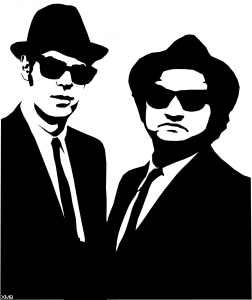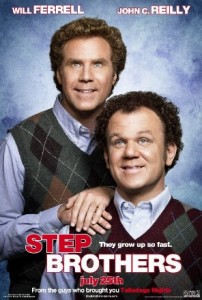As I was haphazardly doing my psychology homework the other day, one video I was assigned to watch caught my attention. It was about the nature vs. nurture debate when it comes to sexual orientation. The video said that the more older brothers a boy has, the more likely he is to be homosexual. Sounds kind of crazy, right? When I first heard it, my first thought was, “what kind of evidence could they have to make a claim like that??” So I researched it more to see the studies done on the topic and if they had any validity.
First study- 2006
 A study done in 2006 was the first to test this idea. Anthony Bogeart, sexologist from Brock University, held an observational study with 944 heterosexual and homosexual men who had brothers (biological or non-biological). Bogeart studied men with both biological and non-biological brothers to see whether or not “being gay because of older brothers” was due to the just having brothers in general (nurture), or there was more to it and there was a biological factor (nature). Boegart also wanted to study the amount of time the brothers spent being raised in the same household or if they were raised together at all, and if it that had any effect on sexual orientation (if it did, this would lean towards the nurture side of the argument). His null hypothesis is that having biological older brothers has no positive influence on being homosexual and the alternative hypothesis is that having biological older brothers does make a boy more likely to be homosexual. His results suggested one should reject the null hypothesis, there is something going on, on a biological level, that makes a boy with biological older brothers more likely to be gay! He found that the time spent with the biological older brothers and non-biological older brothers had no effect on sexual orientation. The only element that helped determine if a boy was gay or not was just having biological older brothers. So this would strongly support the nature side of the debate and also suggest that something is going on, biologically, in the carrying mother in which each son is more likely to be gay than the previous.
A study done in 2006 was the first to test this idea. Anthony Bogeart, sexologist from Brock University, held an observational study with 944 heterosexual and homosexual men who had brothers (biological or non-biological). Bogeart studied men with both biological and non-biological brothers to see whether or not “being gay because of older brothers” was due to the just having brothers in general (nurture), or there was more to it and there was a biological factor (nature). Boegart also wanted to study the amount of time the brothers spent being raised in the same household or if they were raised together at all, and if it that had any effect on sexual orientation (if it did, this would lean towards the nurture side of the argument). His null hypothesis is that having biological older brothers has no positive influence on being homosexual and the alternative hypothesis is that having biological older brothers does make a boy more likely to be homosexual. His results suggested one should reject the null hypothesis, there is something going on, on a biological level, that makes a boy with biological older brothers more likely to be gay! He found that the time spent with the biological older brothers and non-biological older brothers had no effect on sexual orientation. The only element that helped determine if a boy was gay or not was just having biological older brothers. So this would strongly support the nature side of the debate and also suggest that something is going on, biologically, in the carrying mother in which each son is more likely to be gay than the previous.
Second study
 What is the mechanism to explain this finding? The most widely accepted theory, as given my Michael Bailey (sex researcher for Northwestern University), has to do with antibodies. A male baby in a mother’s body is a foreign object. The Y-chromosome has never been in a woman and when the female body is introduced to the male biological system in such a close way, the female body produces antibodies to try and get rid of the unfamiliar material. These maternal antibodies contain female hormones (which, in this case, are what supposedly influences sexual orientation) and the more male babies a woman has, the more of these antibodies she’ll produce. This makes the male babies born after a lot of males more likely to be gay because of the increased female hormones in the mother’s body for the duration of the pregnancy.
What is the mechanism to explain this finding? The most widely accepted theory, as given my Michael Bailey (sex researcher for Northwestern University), has to do with antibodies. A male baby in a mother’s body is a foreign object. The Y-chromosome has never been in a woman and when the female body is introduced to the male biological system in such a close way, the female body produces antibodies to try and get rid of the unfamiliar material. These maternal antibodies contain female hormones (which, in this case, are what supposedly influences sexual orientation) and the more male babies a woman has, the more of these antibodies she’ll produce. This makes the male babies born after a lot of males more likely to be gay because of the increased female hormones in the mother’s body for the duration of the pregnancy.
Is this theory to be trusted? The evidence is clearly there, in hard endpoints, that the more older brothers a male has, the more likely he is to be gay (A boy born first or without any brothers has about a 2-3% chance of being gay, but by the time a woman has her fourth son, the chance goes up to 6%). But could this pattern be due to chance? According to Bogaert (who conducted the first study) we’re still not sure. He reviewed his original study in 2013 and realized the biological mechanism was never actually tested. The mechanism is a strong theory but no test has been done to see if these antibodies actually increase with each male baby. Until then, we have strong evidence reject the null and to believe homosexuality is influenced biologically, but no concrete evidence.
pics-
https://en.wikipedia.org/wiki/Jonas_Brothers
https://en.wikipedia.org/wiki/Step_Brothers_(film)
http://lindyslanding.net/events/bluz-brothers/
http://ccp.jhu.edu/tag/brothers-for-life/
